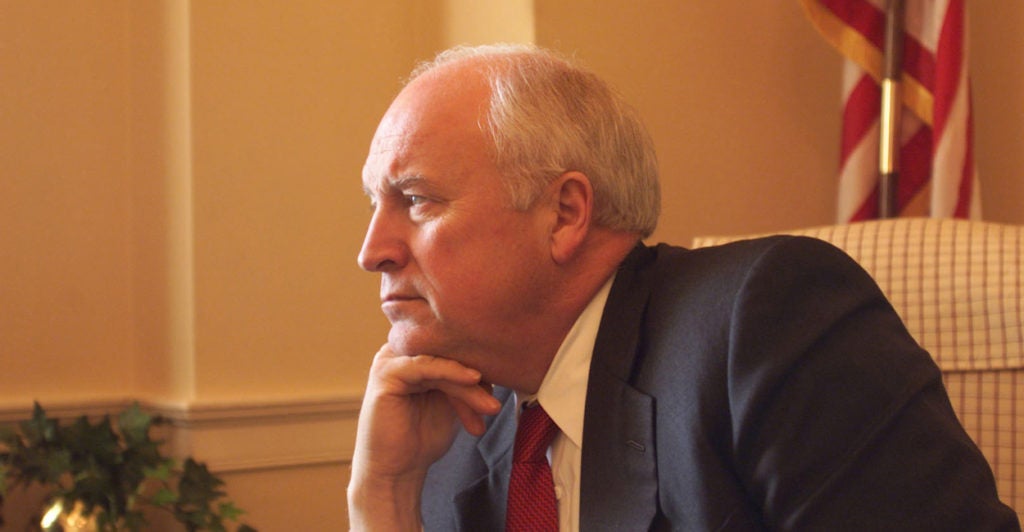Biographers usually paint their subjects in either a positive light or a morally complex one.
Director and screenwriter Adam McKay chose a different path in his new film about Dick Cheney, instead casting his subject as a heartless and cruel man who embodies pretty much everything wrong with modern America.
“Vice” includes enough kernels of truth about Cheney to seem compelling. Yet at every step, the film magnifies, exaggerates, and invents character flaws with almost joyful gratuity, so that the whole film adds up to a skillfully choreographed hit job.
On screen, we see a man ensnared by power politics and the corrupting influence of big oil, ruled by a desire to measure up to his wife, and willing to expend other people’s lives and interests for his own personal gain. It’s “House of Cards,” minus the admission of being fiction.
“Vice” is most instructive not as biography, but as a window into the mind of Hollywood’s elite. The film depicts a moral universe in which the heathen are Republican, and the chief sins include oil, war, male power politics, and heteronormativity. The film’s title “Vice” is a strong hint
—it means more than just VP.
The story picks up in 1963, with Cheney working a blue-collar job in Wyoming—about as far removed from presidential politics as possible. He’s also an alcoholic standing on the verge of a divorce. His wife gives him an ultimatum: to make something of himself, or she’s leaving.
That is his pivotal moment.
From there, Cheney begins his slow rise through D.C. politics, beginning as a congressional staffer, where he learns the ways of Rome and becomes accustomed to dancing along with the powers that be. In that world, he finds himself surprisingly at home and attains a real degree of personal redemption, notwithstanding the moral murkiness of politics. He regains the respect of his wife, and his family stays intact.
That redemptive theme is McKay’s biggest compliment to Cheney. But it doesn’t last. It’s quickly overshadowed by other negative themes, as he begins to crave the spoils of power for their own sake. The movie briskly moves through Cheney’s time as chief of staff to President Gerald Ford, House member, and secretary of defense.
The real meat of the film comes when Cheney joins George W. Bush’s ticket for president in 2000. This is where the painting of Cheney gets especially egregious.
By this time, Cheney is a CEO and a seasoned political operator. He runs circles around Bush, who is portrayed as a know-nothing dunce—a sitting duck for Cheney. Here the filmmakers’ obvious spite for Bush is palpable enough to gag on.
In one pivotal scene before the election, Cheney puts forward a deal: He will only join the ticket if Bush lets him oversee the bureaucracies, the military, energy, and foreign policy. Bush agrees, essentially giving away the store of his presidency, all the while seeming clueless to what he has done.
This transaction captures the image of Bush and Cheney long cherished by the left: Bush as the fool, Cheney the swindler. Whereas a fair portrayal would have shown nuance, putting the two men on an even rational footing, “Vice” indulges the tired caricature of Bush as a bumbling country boy who never deserved to be president.
This is filmmaking as wish fulfillment. And it is also, implicitly, an exercise in self-congratulation. Cheney is the king of vice. All who oppose him, then, are children of light. Looking at you, Hollywood.
It’s true that Cheney did come to a unique and “different arrangement” with Bush as vice president—he admitted that toward the end of his vice presidency. He did have more power than most vice presidents, and critics can rightly judge that.
But the film goes so far as to depict Bush as a puppet president who let Cheney wield the real authority—often on behalf of oil interests.
This framework carries through the entire film. When a crisis comes, it’s Cheney, not Bush, who wields the real power. On 9/11, Cheney takes charge in the Situation Room, running the ship “like a ghost,” as the narrator tells it.
We also see the invasion of Iraq framed in the worst possible light: not based merely on bad intelligence, but quite likely a conspiracy on the part of Cheney to open up Iraqi oil to U.S. companies, presumably to enrich himself. The film cites information originally obtained by Judicial Watch through a Freedom of Information Act request, which shows that an energy task force led by Cheney had a map of oilfields in Iraq in March of 2001. Few details are given, with little context, yet the portrayal all but indicts Cheney in the mind of the viewer.
And that is the real tragedy of “Vice.” Viewers will come to this film not just to be entertained, but to learn “the untold true story that changed the course of history forever,” as the movie trailer promises.
Many will think for themselves. But if most viewers are like the two who sat next to me, they’ll groan and lament at the evil on screen, horrified that this all could have happened. Actor Christian Bale’s rendering will be taken as gospel—even though the film seems more interested in ruining Cheney’s image than giving a true account of his life.
The net effect will be a permanently altered and distorted view of Cheney, all thanks to an effort to portray a flawed public servant as the devil himself. That is a travesty.
